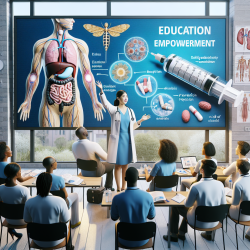Introduction
As a practitioner in the field of special education, you are always seeking ways to enhance your skills and provide better services to your students. One area that has shown significant promise is the implementation of transdisciplinary research, particularly in addressing health disparities among American Indian/Alaska Native (AI/AN) populations. The Collaborative Research Center for American Indian Health (CRCAIH) offers a framework that can be adapted to improve your practice by integrating social determinants of health into your research and intervention strategies.
Understanding Transdisciplinary Research
Transdisciplinary research involves collaboration across various disciplines to address complex public health issues. The CRCAIH model emphasizes respect for tribal sovereignty, sustainability, and the integration of diverse perspectives to tackle AI/AN health disparities. By adopting a transdisciplinary approach, practitioners can move beyond traditional disciplinary boundaries, fostering innovation and comprehensive understanding of health issues.
Key Lessons from CRCAIH
The CRCAIH initiative has highlighted several key lessons that can be applied to your practice:
- Community Engagement: Involving community members in the research process ensures that interventions are culturally relevant and effective. This approach can be adapted to engage parents and stakeholders in special education settings.
- Building Research Infrastructure: Establishing a robust research infrastructure is crucial for sustaining long-term projects. This can include developing policies, securing funding, and creating partnerships with academic institutions.
- Utilizing Core Resources: CRCAIH's technical cores provide expertise in culture, science, and bioethics, which can be leveraged to enhance your understanding of diverse student needs and improve service delivery.
Implementing Transdisciplinary Research in Your Practice
To incorporate the principles of transdisciplinary research into your practice, consider the following steps:
- Identify Key Stakeholders: Collaborate with therapists, educators, and community leaders to form a diverse team that can address the multifaceted needs of your students.
- Focus on Social Determinants of Health: Consider factors such as socioeconomic status, education, and environment when developing interventions. This holistic approach can lead to more effective outcomes.
- Engage in Continuous Learning: Attend conferences, webinars, and workshops to stay informed about the latest research and best practices in transdisciplinary approaches.
Encouraging Further Research
The success of CRCAIH underscores the importance of continued research and collaboration. Practitioners are encouraged to explore additional studies and engage with academic institutions to further enhance their skills and knowledge. By staying informed and actively participating in research initiatives, you can contribute to the advancement of special education practices and improve outcomes for your students.
To read the original research paper, please follow this link: Fostering Social Determinants of Health Transdisciplinary Research: The Collaborative Research Center for American Indian Health.










